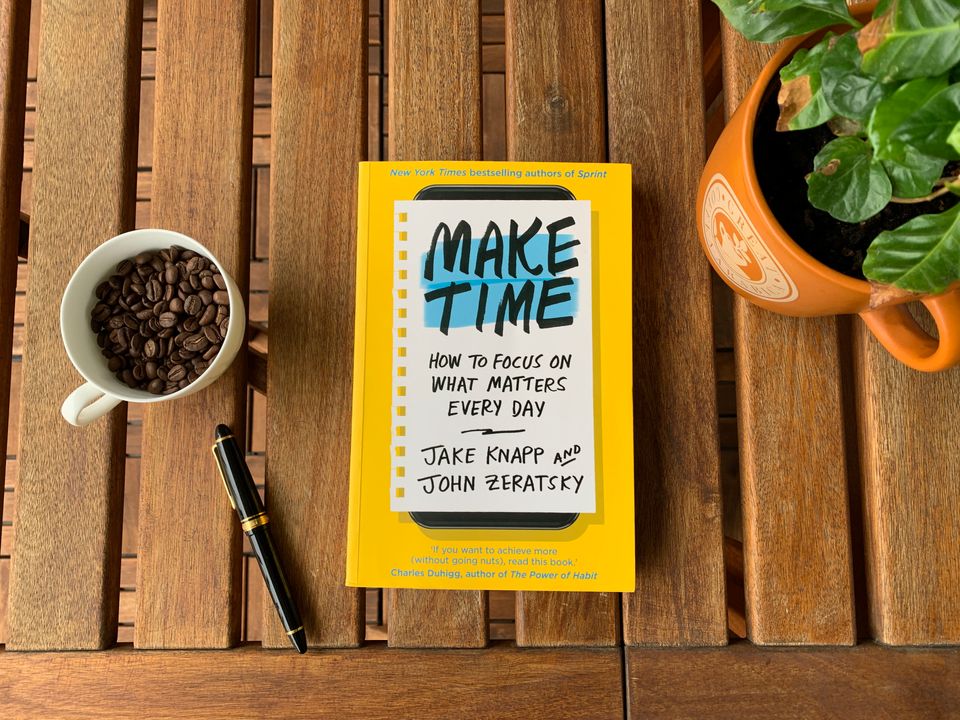Book Club | Make Time

Jake Knapp and John Zeratsky | Read on 2 May 2021
Make Time is a book for time dorks by time dorks. Jake Knapp and John Zeratsky. Jake is an ex Googler and John ex YouTuber and ex Googler. Both found their true passion and pivoted from full time jobs using techniques described in their book.
Make Time is not about solving problems of our busy schedules. It does not share secrets how to clear our calendars. Nor will it give us back the time we lost on Facebook or YouTube. It is however about finding time for those things that we are passionate about. Make Time proposes a very simple approach how to carve out small chunks of time for the topics that are close to our hearts.
Jake and JZ introduce two concepts that help explain why we are so busy and why we never have time. They define them as Busy Bandwagon and Infinity Pool.
The former is what our culture tends to encourage. Being busy is perceived as something to be proud of, something that we should all strive for. At work, when someone asks how you are, the first thing you tend to say is "I'm busy". I've heard people say "great, but I'm more busy". Society sometime has that perception that if you are not "busy", then there must be something wrong with you.
The latter is about constant and endless distractions. These days there are so many of them. We spend so much time being distracted that it is almost a full time job. Statistics across countries show that we now spend more time on our mobile devices than on watching TV. . . and an average American spends close to four hours per day watching telly. No matter the education level, the income or the background. This is applicable to us all. At the same time IT companies are great at developing technologies targeted to capture and keep our attention. Think about the time when you have just watched a video on YouTube or read an article on BBC. As soon as you were finished, there was another video or another article waiting for you.
Combining the Busy Bandwagon and Infinity Pools we are doomed.
Or not?
John and JZ suggest a very simple framework that falls into four categories
- Highlight
- Laser
- Energize
- Reflect
First, there is the Highlight. The main and the most important task of the day. Our priority. This could be anything - spending time with your kids, writing a draft chapter for your book, catching up on e-mails. Whatever it is, you get it done. The Highlight is not the only item you do; there are other. That however depends on you and your schedule.
How do you select your Highlight? The simplest approach is to choose between what is Urgent, what gives you Satisfaction and what brings you Joy. If that doesn't work you can research all of the other sixteen tactics suggested in the book.
Second point - the Laser. The psychological state of mind where we are 100% focused on the task at hand. Nothing else exists. Our attention is so strong and our focus on precise that even if a bomb went off in a room next door we wouldn't have noticed. Problem is, how do you achieve that when your phone vibrates every time you receive a new text, e-mails notification keep popping up and news banners jump out unexpected. Not easy. In the book there are more than forty tactics on how to get into and stay in the Laser mode. For example:
- wear an analogue wrist watch, avoid using smart watch.
- put away your toys - set your phone to flight mode. No connection = no distractions.
Third is Energize. This is about the connection between your body with your brain. If you focus too much on your brain and forget your body, you will not be able to perform your best. This is not about becoming an ultra runner or an Olympic champion. This is about making sure that you are rested, energized and healthy. Drink enough water, get enough sleep, do some exercises etc. Body and brain connection here is meant in sense of tiredness, for example lack of sleep, working late into the night etc. It is not about physical injury or disability.
One item proposed here, which I highly recommend, is meditation. This can be anything; taking 15 minutes each day to think about what you are grateful for, using apps that offer guided meditation or a full blown monk-like meditation.
Underlying all of that is the fourth, and a very crucial part. Reflect. It is a simple scientific approach where we review each day and reflect on what to do differently the next. Jake and JZ outlined a form you can use, but if you don't have a book a simple reflection on what went well and what didn't. is already a good starting point.
Overall it is a great book and I highly recommend it. It's flexible. You don't need to read it back to back. You can jump around to find tactics and approaches that work for you.
What I find best about Make Time is that it makes you more intentional about what you do and how you do it. For example, select "spend time with my kids after dinner" as your highlight and do exactly that. Use Laser tactics to remove distractions (phone, iPad whatever else). Being intentional about what we do with your time is already a great step forward.
If you are interested in purchasing the book check out the following links on Amazon:
Until next time
M | K

Member discussion